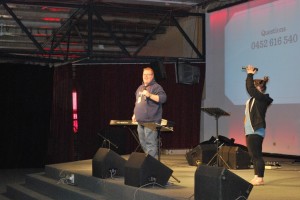2013 is shaping up to be the year of the youth work conference! Here in Australia we are having our largest secular and sacred youth work conferences within two months of each other. There are a number of mini conferences and more youth work seminars than you can poke a stick at. Even though it puts a kybosh on some of the plans I made for this year, I hope to attend many of these conferences. I love the highs, the opportunity to hear from seasoned veterans and mingle with colleagues. In short I love the context of conferences. But more than that, I love the questions that I am left with after leaving these conferences.
In youth work we never reach the pinnacle of our practice. Like those long hikes up mountains where we think we will reach the top just over the next rise and BAM…. There is the next hill. We just learn everything there is to know about youth participation and BAM… the next youth work journal says there is more. We just reach the top of our understanding of drug and alcohol and BAM… we need to understand mental health now as well. We become the best group worker ever and BAM… now we need to run groups online. Every day brings a new challenge and a new skill we need. When I go to conferences I am often left wondering what the next hill is that I need to climb.
One of the hills that always stands in the way of youth workers is that of ongoing development. Conferences are great for motivating and encouraging and can even give us new ways to practice… but they rarely DEVELOP practice. To develop practice takes time, opportunity and effort. So after the conferences here are 5 ways to develop your youth work practice.
-
Reflective practice really does work. While you are at the conference you probably wrote copious notes. Set aside time to read them again and journal about your experiences. How might what you have just learnt fit into your current practice? Use your colleagues to bounce ideas off or use a group supervision session to flesh out your thoughts.
-
Read a book! or two, or more. Read about what you have learnt. Don’t take a hour seminar at face value. Don’t take the week or couple of days or webinar for granted… question everything! Read wide and read deep. See if what you have been told stacks up.
-
Get some accountability. A conference high is an amazing thing. You feel bullet proof on top of the mountain. on the trip back down it is easy to forget what you learnt or why you went in the first place. Having a mentor or someone who will hold you accountable to your learnings from the conference will help you develop for the long run.
-
Take time for yourself. A conference takes it out of you. You’re learning, networking and generally trying to keep up. It often runs across multiple days and you are on the go the whole time. Within the following month take some time to just recharge… the sooner the better. Your self care is really important to developing your practice post-conference
-
Sow into others. Some say the best way to learn is to teach. Take the time to pass on some of the knowledge you have picked up on the way. Pass it on at team meetings, to younger staff members to other service providers who weren’t at the conference. Passing on your new knowledge to others will help you wrestle with how to impliment it and will develop a wide net of practice.
Developing youth work practice is challenging and we must take every opportunity that presents itself to gain encouragment and motivation for the journey. Conferences are a great mountaintop experience but they are just a jump… its the journey thereafter which is most important.
We hope these five tips will help you plan for your post-conference practice development.







